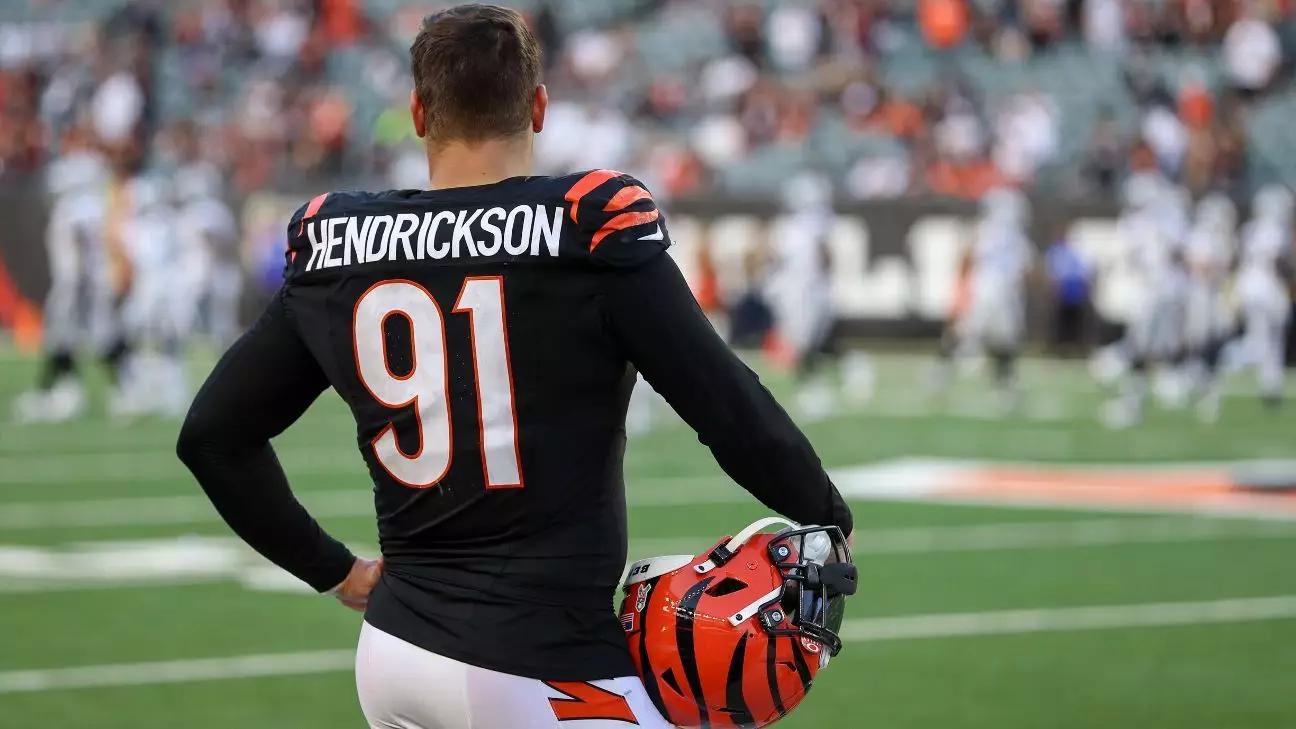In the complex landscape of professional football, individual player stability often clashes with team interests, creating tension that can impact both performance and morale. The case of Cincinnati Bengals’ defensive end Trey Hendrickson exemplifies this ongoing struggle. Despite his impressive achievements—most notably leading the league with 17.5 sacks last season—Hendrickson’s stance on refusing to participate in the upcoming season reveals a deeper issue: the delicate balance between contractual security and athletic ambition.
Hendrickson’s refusal to practice and his decision to sit out signals more than mere dissatisfaction; it underscores the importance of guaranteed financial security in NFL contracts. He has maintained consistent messaging that he seeks a fair deal that prioritizes a secure future, not just a lucrative one. This stance is emblematic of a broader shift in the league, where veteran players are increasingly demanding contracts that provide long-term stability, especially as they approach their 30s. Yet, the Bengals appear hesitant to meet these demands, particularly concerning guaranteed money, which remains the sticking point in negotiations.
While Hendrickson and Cincinnati are aligned on the overall value and contractual length, the disparity over guaranteed compensation has stalled progress. The lack of tangible movement demonstrates the power imbalance that can exist in NFL negotiations—players wield leverage through their performance but often lack security without guaranteed contracts. Hendrickson’s willingness to entertain other teams at the beginning of the offseason illustrated his openness to changing circumstances, but thus far, no deal has materialized, highlighting how uncertain the landscape remains for aging stars seeking a secure future.
Performance vs. Security: The Cost of Player Discontent
Hendrickson’s case raises critical questions about the long-term health of NFL contracts and the league’s approach to player welfare. His decision to sit out practices is a calculated move, a form of protest rooted in the desire for assured stability. Yet, it also risks devaluing his contributions; without participating in team activities, he risks diminishing his influence and visibility, which could eventually impact his bargaining position.
The NFL’s structure, historically built around short-term contracts and limited guarantees, often leaves players vulnerable as they edge closer to the twilight of their careers. Hendrickson’s stance—valuing security over immediate participation—might be a wake-up call for teams, emphasizing that player advocacy for guaranteed pay isn’t mere greed but a logical response to a system that prioritizes team control. If teams continue to resist offering fully guaranteed deals, they may face increasing resistance from players who won’t settle for less.
Furthermore, the broader implications extend beyond Hendrickson’s individual situation. The NFL could benefit from revisiting its stance on player guarantees, recognizing that protecting athletes’ futures ultimately enhances league stability. Players who feel secure are more likely to perform at their best and foster longer, more mutually beneficial relationships with their teams.
The Power Dynamics of Veteran Negotiations
Hendrickson’s reluctance to play underscores a larger trend: veteran players are increasingly asserting their agency in contract talks. This shift signifies a recognition that, regardless of past performance, career longevity and financial security require proactive strategies. While the league has historically favored team control—limiting guaranteed investments—a new generation of players refuses to accept that paradigm passively.
His comments reflect a mindset that champions self-advocacy, emphasizing that recognition and respect are intertwined with monetary security. Hendrickson’s statement, “Recognition’s not something I’m chasing,” suggests a focus on tangible stability rather than fleeting accolades. This attitude could reshape how franchises approach negotiations, possibly prompting more transparent and fair dealings.
Ultimately, Hendrickson’s stand is a testament to the evolving dynamic where players are no longer just commodities but stakeholders demanding fair treatment. His willingness to risk a season without playing demonstrates a conviction that long-term peace of mind should be non-negotiable. It’s a bold move that questions traditional NFL power structures and highlights the importance of player agency in the modern era.


Leave a Reply